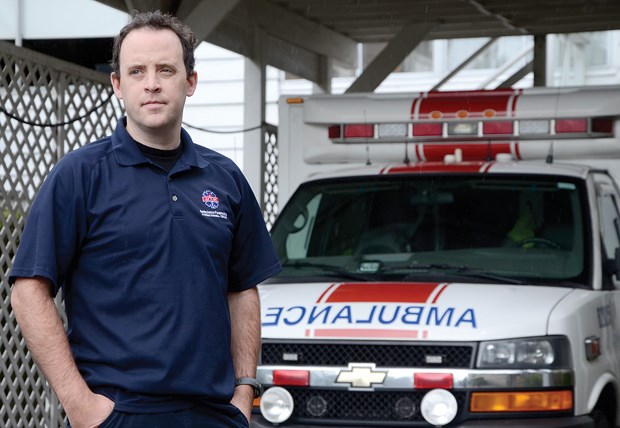West Vancouver's one ambulance won't be stationed in the municipality's new public safety building.
Where it will be stationed is both a mystery and a source of concern for North Vancouver paramedic Cameron Eby.
Eby, a provincial executive for the Ambulance Paramedics of B.C. union, said it's a matter of time before the current location adjacent to the fire station on 16th Street is shuttered.
"It's an old, run-down house that's been converted to an ambulance station, so to think that it could get worse from there is hard to fathom, but it just might," he said.
Eby said he didn't know when the eviction would happen, "but it is going to happen."
A representative from B.C. Ambulance Service did not confirm or deny Eby's comments.
"We have no plans for the foreseeable future," said Kelsie Carwithen, media relations manager with B.C. Ambulance Service.
Eby was critical of the ambulance service management.
"Unfortunately, the Ambulance Service doesn't have a terrific track record for securing new land or buildings to operate their ambulances."
In 2013, B.C.
Ambulance Service opted to move ambulances in Victoria from several satellite stations to a central depot.
With a new ambulance station under construction at Lions Gate Hospital, Eby suggested the service may move to a similar setup on the North Shore.
"Our feeling is that they will likely shut down the West Vancouver ambulance station completely when they're evicted and it will be centralized to North Vancouver," he said.
That would be a mistake, according to Eby.
"Our opinion is that the response times would suffer from that change because the ambulance
would - at least twice a day when it's doing its shift changes - have to leave the community," he said.
There can also be problems when an ambulance is parked outdoors and exposed to the elements, said Eby.
Drugs like epinephrine - a dose of adrenaline used to treat life-threatening allergic reactions - and Narcan - which is often prescribed for drug overdoses - can be compromised by extreme cold. If the temperature in the ambulance drops below a certain level, there's a possibility of ice crystals forming in injectable drugs and IV solutions.
Additionally, response
times can lag if a paramedic needs to clear snow off the hood or de-fog the windshield.
In Deep Cove, the ambulance station is "really quite deplorable," according to Eby.
The station is a windowless room in a longterm care facility, and the bathrooms are at the other end of the building, Eby said.
The Deep Cove station is considered a low priority on the North Shore, Eby explained. When there are only two ambulances available to serve the North Shore - because others have been called to neighbouring areas for instance -Deep Cove
loses its ambulance so that paramedics can be split between West and North Vancouver.
When there is only one ambulance to serve the North Shore, the ambulance is parked at Westview.
This happens several times a day, Eby said.
Eby has previously called for a second ambulance in West Vancouver.
When responding to a call in the British Properties from Deep Cove, the response time can be as long as 25 minutes, according to Eby.
"We find it completely inadequate to only have one ambulance to begin with," he said.



